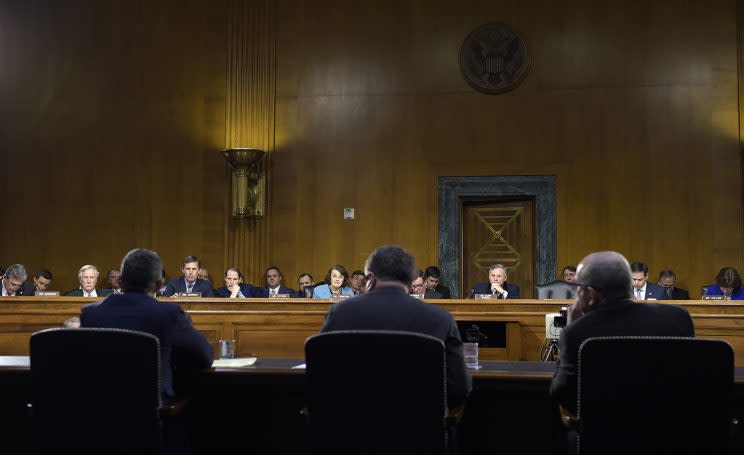Russia used fake news to manipulate election, Senate panel is told

Russia-generated fake news was the main focus as the Senate intelligence committee began its investigation into interference with the 2016 elections in the United States.
“Through the end of 2015 and the start of 2016,” said Clint Watts, a witness for the Thursday morning hearing, “Russian influence system began pushing themes and messages seeking to influence the outcomes of the U.S. presidential election. Russia’s overt media outlets and covert trolls sought to sideline opponents on both sides of the political spectrum with adversarial views toward the Kremlin. They were in full swing during both the Republican and Democratic primary season and may have helped sink the hopes of candidates more hostile to Russian interests long before the field narrowed.”
“Sen. Rubio,” added Watts, “in my opinion, you anecdotally suffered from these efforts.” Sen. Marco Rubio, R-Fla., a member of the committee, was a candidate for the Republican nomination.
Watts is a fellow at the Foreign Policy Research Institute and a former Army officer and FBI special agent.
The vice chairman of the committee, Sen. Mark Warner, D-Va., called the tactics “Russia propaganda on steroids” and said they were “designed to poison the national conversation in America.” Warner had cited the reports of Internet trolls generating fake news stories and targeting them at swing states last week at a joint news conference with the chairman of the committee, Sen. Richard Burr, R-N.C. In contrast to the rift on the House committee — where Rep. Adam Schiff, D-Calif., has asked for Chairman Rep. Devin Nunes, R-Calif., to recuse himself from looking into the Trump campaign’s potential ties to Russia — the Senate committee has projected a message of unity after a divided start to the investigation.
“The vice chairman and I realize that if we politicize this process, our efforts will likely fail,” said Burr in his opening remarks. “The public deserves to hear the truth about possible Russian involvement in our elections, how they came to be involved, how we may have failed to prevent that involvement, what actions were taken in response, if any, and what we plan to do to ensure the integrity of future free elections at the heart of our democracy.”
Watts later cited specific examples of fake news stories promulgated by the Trump campaign. “Paul Manafort cited the fake Incirlik story as a terrorist attack on CNN, and he used it as a talking point. On 11 October, President Trump stood on the stage and cited what appears to be a fake news story from Sputnik News that disappeared from the Internet. He denies the intel from the United States about Russia. He claimed that the election could be rigged; that was the No. 1 theme pushed by RT, Sputnik News, ‘white’ outlets all the way up until the election. He made claims of voter fraud, that President Obama’s not a citizen, that Congressman Cruz is not a citizen. So part of the reason active measures works and it does today in terms of Trump Tower being wiretapped is because they parrot the same lines.”
“Why did he think he could get away with it this time?” asked Sen. James Lankford, R-Okla. “This is not new for the Russians. They’ve done this for a long time across Europe, but it was much more engaging this time in our election. Why now?”
“I think this answer is very simple,” replied Watts, “and is what no one is really saying in this room which is part of the reason ‘active measures’ have worked in this U.S. election is because the commander in chief has used Russian active measures at times against his opponents.
“… So Putin is correct,” continued Watts, referencing the Russian president’s claim earlier Thursday that he didn’t meddle in the U.S. elections. “He can say that he’s not influencing anything because he’s just putting out a stance, but until we get a firm basis on fact and fiction in our own country, get some agreement about the facts, whether it be ‘Do I support the intelligence community or a story I read on my Twitter feed,’ we’re going to have a big problem.”
Watts claimed that Russian Twitter bots barrage Trump’s Twitter account with conspiracy theories at times they know he’s online, hoping to catch his attention.
The entire roster of witnesses — Watts, along with Eugene Rumer of the Carnegie Endowment for International Peace and Roy Godson of Georgetown University — agreed that the Russians didn’t have a preference for any party, but would attempt to help candidates they thought would be favorable toward their policy or easy to corrupt.
They agreed there was no direct tampering with election results.
Read more from Yahoo News:



